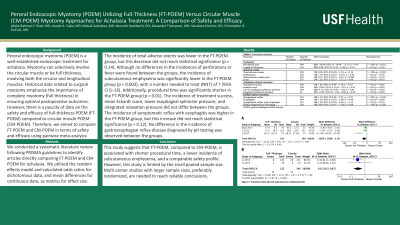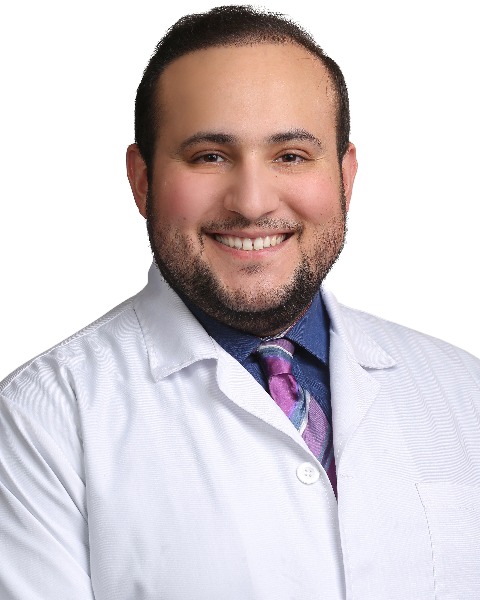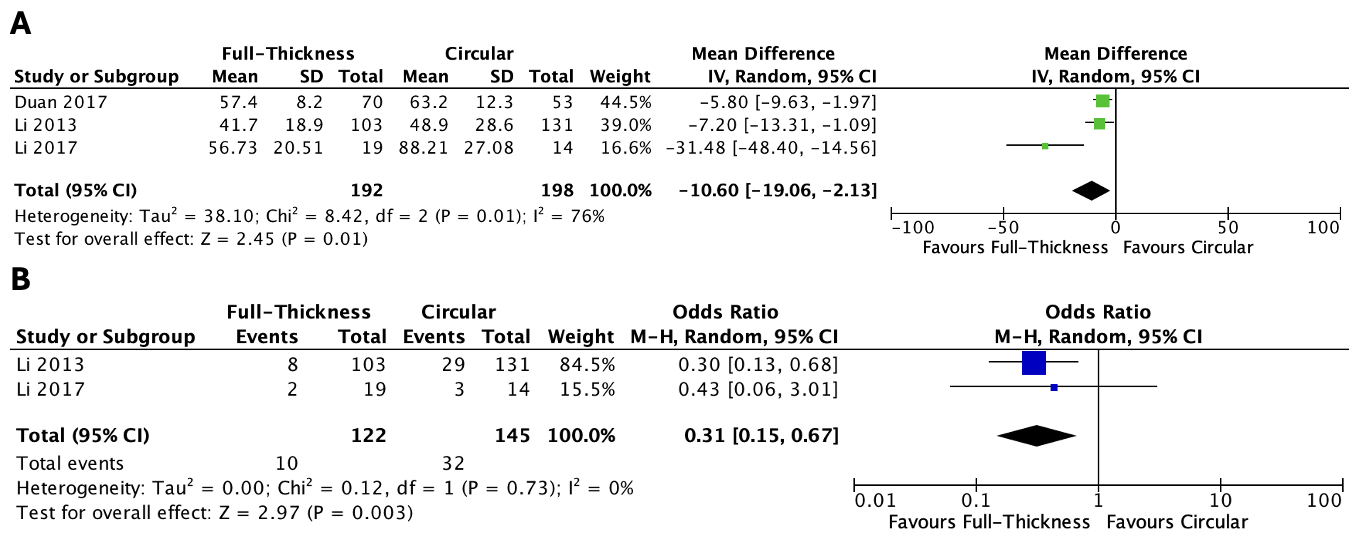Sunday Poster Session
Category: Interventional Endoscopy
P1035 - Peroral Endoscopic Myotomy (POEM) Utilizing Full-Thickness (FT-POEM) Versus Circular Muscle (CM-POEM) Myotomy Approaches for Achalasia Treatment: A Comparison of Safety and Efficacy
Sunday, October 27, 2024
3:30 PM - 7:00 PM ET
Location: Exhibit Hall E

Has Audio

Abdul-Rahman F. Diab, MD
University of South Florida Morsani College of Medicine and University of Central Florida, HCA Healthcare GME
Ocala, FL
Presenting Author(s)
Abdul-Rahman F. Diab, MD1, Joseph A. Sujka, MD2, Mehak Sachdeva, MD3, Kenneth Hackbarth, DO3, Alexander Thompson, MD3, Salvatore Docimo, DO2, Christopher G. DuCoin, MD2
1University of South Florida Morsani College of Medicine and University of Central Florida, HCA Healthcare GME, Ocala, FL; 2University of South Florida Morsani College of Medicine, Tampa, FL; 3University of Central Florida, HCA Healthcare GME, Ocala, FL
Introduction: Peroral endoscopic myotomy (POEM) is a well-established endoscopic treatment for achalasia. Myotomy can selectively involve the circular muscle or be full thickness, involving both the circular and longitudinal muscles. Historical data related to surgical myotomy emphasize the importance of complete myotomy (full thickness) in ensuring optimal postoperative outcomes. However, there is a paucity of data on the safety and efficacy of full-thickness POEM (FT-POEM) compared to circular muscle POEM (CM-POEM). Therefore, we aimed to compare FT-POEM and CM-POEM in terms of safety and efficacy using pairwise meta-analysis.
Methods: We conducted a systematic literature review following PRISMA guidelines to identify articles directly comparing FT-POEM and CM-POEM for achalasia. We utilized the random effects model and calculated odds ratios for dichotomous data, and mean differences for continuous data, as metrics for effect size.
Results: The incidence of total adverse events was lower in the FT-POEM group, but this decrease did not reach statistical significance (p = 0.14). Although no differences in the incidences of perforations or fever were found between the groups, the incidence of subcutaneous emphysema was significantly lower in the FT-POEM group (p = 0.003), with a number needed to treat (NNT) of 7 (95% CI 6–16). Additionally, procedural time was significantly shorter in the FT-POEM group (p = 0.01). The incidence of treatment success, mean Eckardt score, lower esophageal sphincter pressure, and integrated relaxation pressure did not differ between the groups. The incidence of symptomatic reflux with esophagitis was higher in the FT-POEM group, but this increase did not reach statistical significance (p = 0.12). No difference in the incidence of gastroesophageal reflux disease diagnosed by pH testing was observed between the groups.
Discussion: This study suggests that FT-POEM, compared to CM-POEM, is associated with shorter procedural time, a lower incidence of subcutaneous emphysema, and a comparable safety profile. However, this study is limited by the small pooled sample size. Multi-center studies with larger sample sizes, preferably randomized, are needed to reach reliable conclusions.

Note: The table for this abstract can be viewed in the ePoster Gallery section of the ACG 2024 ePoster Site or in The American Journal of Gastroenterology's abstract supplement issue, both of which will be available starting October 27, 2024.
Disclosures:
Abdul-Rahman F. Diab, MD1, Joseph A. Sujka, MD2, Mehak Sachdeva, MD3, Kenneth Hackbarth, DO3, Alexander Thompson, MD3, Salvatore Docimo, DO2, Christopher G. DuCoin, MD2. P1035 - Peroral Endoscopic Myotomy (POEM) Utilizing Full-Thickness (FT-POEM) Versus Circular Muscle (CM-POEM) Myotomy Approaches for Achalasia Treatment: A Comparison of Safety and Efficacy, ACG 2024 Annual Scientific Meeting Abstracts. Philadelphia, PA: American College of Gastroenterology.
1University of South Florida Morsani College of Medicine and University of Central Florida, HCA Healthcare GME, Ocala, FL; 2University of South Florida Morsani College of Medicine, Tampa, FL; 3University of Central Florida, HCA Healthcare GME, Ocala, FL
Introduction: Peroral endoscopic myotomy (POEM) is a well-established endoscopic treatment for achalasia. Myotomy can selectively involve the circular muscle or be full thickness, involving both the circular and longitudinal muscles. Historical data related to surgical myotomy emphasize the importance of complete myotomy (full thickness) in ensuring optimal postoperative outcomes. However, there is a paucity of data on the safety and efficacy of full-thickness POEM (FT-POEM) compared to circular muscle POEM (CM-POEM). Therefore, we aimed to compare FT-POEM and CM-POEM in terms of safety and efficacy using pairwise meta-analysis.
Methods: We conducted a systematic literature review following PRISMA guidelines to identify articles directly comparing FT-POEM and CM-POEM for achalasia. We utilized the random effects model and calculated odds ratios for dichotomous data, and mean differences for continuous data, as metrics for effect size.
Results: The incidence of total adverse events was lower in the FT-POEM group, but this decrease did not reach statistical significance (p = 0.14). Although no differences in the incidences of perforations or fever were found between the groups, the incidence of subcutaneous emphysema was significantly lower in the FT-POEM group (p = 0.003), with a number needed to treat (NNT) of 7 (95% CI 6–16). Additionally, procedural time was significantly shorter in the FT-POEM group (p = 0.01). The incidence of treatment success, mean Eckardt score, lower esophageal sphincter pressure, and integrated relaxation pressure did not differ between the groups. The incidence of symptomatic reflux with esophagitis was higher in the FT-POEM group, but this increase did not reach statistical significance (p = 0.12). No difference in the incidence of gastroesophageal reflux disease diagnosed by pH testing was observed between the groups.
Discussion: This study suggests that FT-POEM, compared to CM-POEM, is associated with shorter procedural time, a lower incidence of subcutaneous emphysema, and a comparable safety profile. However, this study is limited by the small pooled sample size. Multi-center studies with larger sample sizes, preferably randomized, are needed to reach reliable conclusions.

Figure: Procedural time (A) and subcutaneous emphysema (B).
Note: The table for this abstract can be viewed in the ePoster Gallery section of the ACG 2024 ePoster Site or in The American Journal of Gastroenterology's abstract supplement issue, both of which will be available starting October 27, 2024.
Disclosures:
Abdul-Rahman Diab indicated no relevant financial relationships.
Joseph Sujka indicated no relevant financial relationships.
Mehak Sachdeva indicated no relevant financial relationships.
Kenneth Hackbarth indicated no relevant financial relationships.
Alexander Thompson indicated no relevant financial relationships.
Salvatore Docimo indicated no relevant financial relationships.
Christopher DuCoin indicated no relevant financial relationships.
Abdul-Rahman F. Diab, MD1, Joseph A. Sujka, MD2, Mehak Sachdeva, MD3, Kenneth Hackbarth, DO3, Alexander Thompson, MD3, Salvatore Docimo, DO2, Christopher G. DuCoin, MD2. P1035 - Peroral Endoscopic Myotomy (POEM) Utilizing Full-Thickness (FT-POEM) Versus Circular Muscle (CM-POEM) Myotomy Approaches for Achalasia Treatment: A Comparison of Safety and Efficacy, ACG 2024 Annual Scientific Meeting Abstracts. Philadelphia, PA: American College of Gastroenterology.
